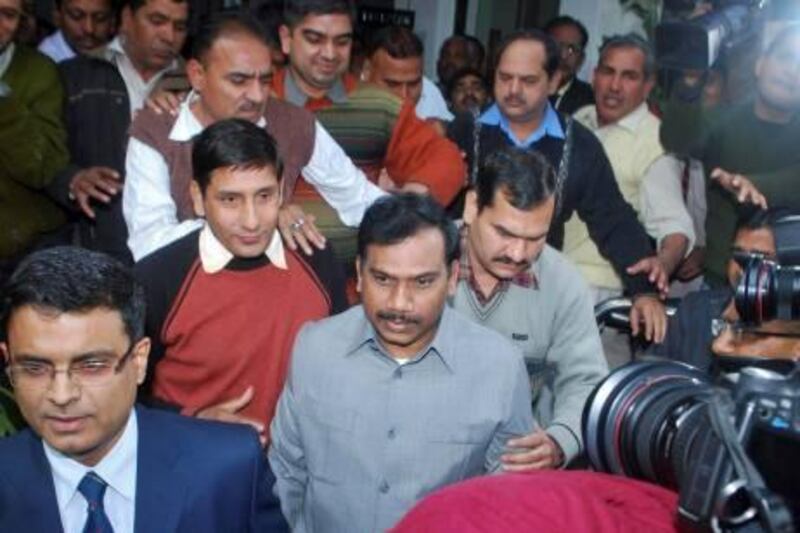MUMBAI // Etisalat's Indian subsidiary rejected allegations made on Thursday by a national investigative agency that it had purchased the licence for second-generation (2G) mobile services at deflated prices, resulting in a significant loss for the Indian exchequer.
"The company is not party to the matter referred to, before the court," said a spokeswoman for Etisalat DB Telecom, a joint venture between Etisalat and Swan Telecom.
She said the company had "followed all [government] rules" and denied that it had received any preferential treatment in the allotment of the 2G licence. The licence was awarded before Etisalat entered into a partnership with Swan in India.
On Thursday, a lawyer for India's Central Bureau of Investigation (CBI) alleged that "undue favours" were granted to the company, allowing it to get the licence at a "low rate". The lawyer levelled the same accusation against Norway's Telenor, which owns a majority stake in India's Unitech Wireless, alleging that the granting of licences to the two companies resulted in a collective revenue loss of 71.05 billion rupees (Dh5.72bn) for the government.
Nearly a dozen telecoms operators are under suspicion of receiving 2G licences at throwaway prices, but Etisalat DB and Telenor are the first two companies to be officially named by the CBI in the scandal that resulted in the loss of an estimated US$39 billion (Dh143.24bn) to the Indian Treasury. The scandal has snowballed into a major embarrassment for the government and has resulted in a deadlock in parliament.
The CBI alleges that "an arbitrary condition" was set by Andimuthu Raja, the telecoms minister at the time the licences were awarded, to favour a few selected operators, including the firm that is now Etisalat DB. Mr Raja, who was sacked in November, was arrested by the CBI last week along with two aides from the telecoms ministry. He denies any wrongdoing.
The fresh allegations come after the Supreme Court of India issued a notice last month to Etisalat DB and 10 other private operators responding to a petition by a non-governmental organisation seeking the cancellation of the spectrum licences.
The allegations seem to have heightened the many procedural hurdles faced by the company in recent months in expanding in India, the world's fastest-growing mobile phone market after China. India has more than 700 million mobile subscribers, and 17 million are added every month.
In December, the telecoms ministry recovered $2.2 million from Etisalat DBbecause the company missed a deadline for rolling out 2G services in four zones. The ministry imposed similar penalties on Aircel, Uninor and Dishnet.
Last month, Mohammed Omran, the chairman of Etisalat, met Kapil Sibal, the new telecoms minister, in what analysts described as an urgent effort by Etisalat to escape its growing troubles in India. Mr Omran, who was accompanied by Mohammed Sultan al Owais, the UAE's ambassador to India, downplayed the meeting as a simple "courtesy call" to reaffirm the group's commitment to deliver its best services to Indian consumers.
Mr Omran has expressed a keen interest in acquiring a local mobile operator or merging Etisalat's India operations with such an entity. He was recently in talks with India's Reliance telecoms unit, but the talks stalled over a disagreement, details of which were not made public.
The biggest threat facing Etisalat, which has made a significant investment in India, is the cancellation of its licence, said Kamlesh Bhatia, an analyst in Mumbai for Gartner, a global technology research company.
Mr Sibal, the telecoms minister, recently said he was reviewing the licensing process and warned that some licences could be revoked.
Additionally, Mr Bhatia says Etisalat DB's profit may be significantly reduced because of increased competition and price wars with other private operators in India's crowded telecoms market.





